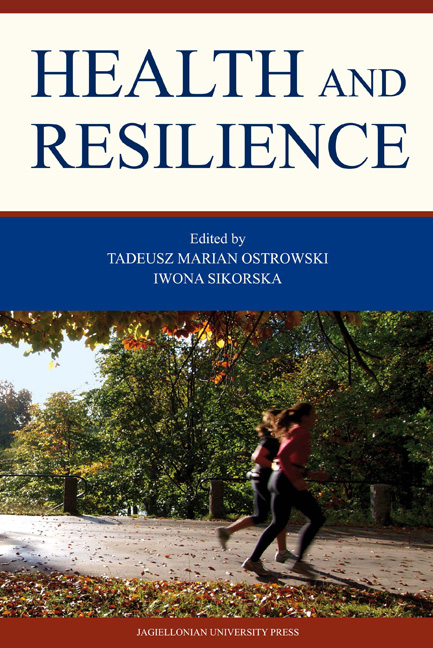Book contents
- Frontmatter
- TABLE OF CONTENTS
- Introduction
- I SOCIAL AND METHODOLOGICAL CONTECTS OF RESILIENCE
- Resilience in the light of research and theoretical reflection
- Naturalism, normativism and Havi Carel's phenomenological approach to health and illness
- Testing the sense of identity in people with highly functioning autism as theory-methodological problem
- “The beneficial life stories.” Health and mental resilience from the narrative perspective
- II RESILIENCE IN DEVELOPMENT
- III RESILIENCE AND DISEASE
- List of Authors
Resilience in the light of research and theoretical reflection
from I - SOCIAL AND METHODOLOGICAL CONTECTS OF RESILIENCE
Published online by Cambridge University Press: 05 December 2014
- Frontmatter
- TABLE OF CONTENTS
- Introduction
- I SOCIAL AND METHODOLOGICAL CONTECTS OF RESILIENCE
- Resilience in the light of research and theoretical reflection
- Naturalism, normativism and Havi Carel's phenomenological approach to health and illness
- Testing the sense of identity in people with highly functioning autism as theory-methodological problem
- “The beneficial life stories.” Health and mental resilience from the narrative perspective
- II RESILIENCE IN DEVELOPMENT
- III RESILIENCE AND DISEASE
- List of Authors
Summary
Abstract
Resilience has been characterized in the paperfrom from the perspective of a theoretical point of view and in the light of the results of empirical research. Two terms are used in the literature: resiliency, as a dispositional trait of personality and resilience, as the transactional process of relation between individual and environment and as the process of coping behaviour. The first meaning of the term is more emphasised in the paper. Psychological resiliency is discussed in the context of emotional and cognitive mechanisms. The next part of the article is devoted to determinants of resiliency from cognitive, social and existential point of view. Development and health implications of resiliency are discussed at the end of this paper.
Key words: resiliency, resilience, personality, coping, emotions, spirituality, religiosity, health
Resilience belongs to the positive psychological categories, which were established in order to clarify why the individual does not break down in the face of difficulties. The term comes from the 1950s, and its current popularity is connected with development of positive psychology and health psychology. Two similar terms used in the literature should be distinguished: resiliency as a dispositional trait of personality and resilience as the transactional process of relation between individual and environment and as the process of coping behaviour. The first meaning of the term is more emphasised in this paper.
- Type
- Chapter
- Information
- Health and Resilience , pp. 13 - 24Publisher: Jagiellonian University PressPrint publication year: 2014

